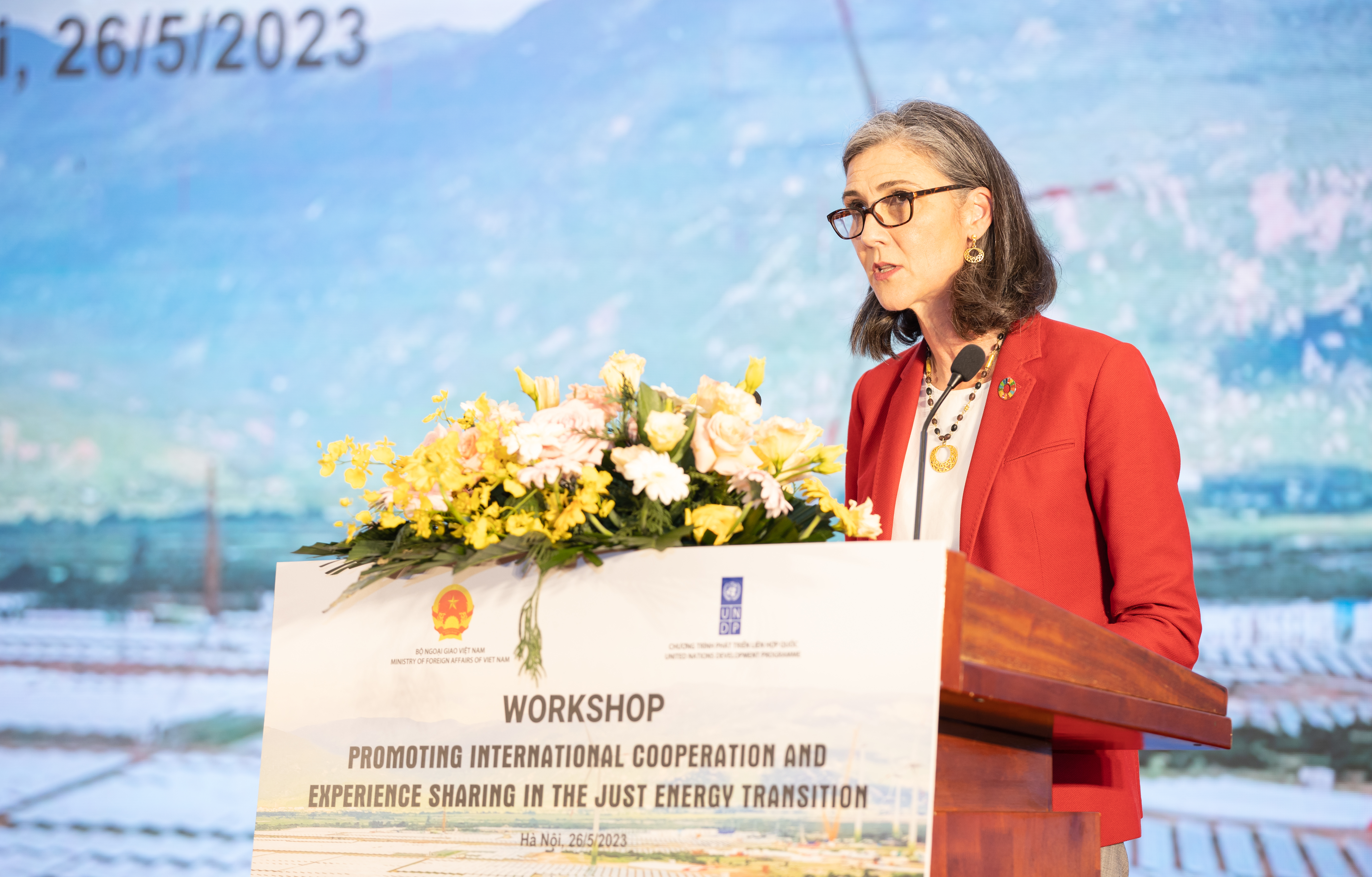Workshop on “Promoting International Cooperation and Experience Sharing in the Just Energy Transition”
May 26, 2023

- Excellency Mr Do Hung Viet, Deputy Minister, Ministry of Foreign Affairs of Viet Nam;
- Mr Pham Hai Anh, Director General, Department of International Organizations;
- Distinguished Representatives from the Party Central Committees, National Assembly, Ministries, and 63 provinces of Viet Nam;
- Representatives and Delegations from Bangladesh, Brazil, India, Indonesia, Kazakhstan, Pakistan, the Philippines, Senegal and South Africa;
- Ms Pauline Tamesis, UN Resident Coordinator in Viet Nam;
- Ambassadors, Development Partners, Colleagues from UN agencies;
- Distinguished Guests, Ladies and Gentlemen;
A very good afternoon and xin chào to you all.
It is a pleasure to join Vice Minister Viet and Director General Hai Anh in welcoming you to this event on the Just Energy Transition.
My sincere gratitude to the Government of Viet Nam for the strong partnership with UNDP, and my particular appreciation to the Ministry of Foreign Affairs for leading the organization of this important and timely event.
Excellencies, Ladies and Gentlemen,
To avoid catastrophic climate change and establish a trajectory that is compatible with the Paris Agreement, transformative changes to energy systems are urgently needed.
Globally, energy accounts for more than two-thirds of total greenhouse gas emissions. This makes transformation of the energy sector centrally important in reducing emissions, and tackling the global climate crisis. Last year, investment in renewable energy reached approximately US$500 billion, while the share of wind and solar energy reached a record 12 percent of global electricity generation.
I take this opportunity to congratulate the Government of Viet Nam for the recent adoption of the long-awaited Power Development Plan 8, which aims to achieve 10-GigaWatt offshore wind capacity by 2030, and reach a renewable energy target of 39.2 percent by 2030.
At today’s workshop, we will hear from representatives of South Africa, Indonesia and Viet Nam on their experience in implementing their Just Energy Transition Partnerships. We will also hear from experts on technology, finance, and the “just” aspects of the energy transition. This exchange comes at an important time, contributing to fostering dialogue and knowledge exchange, and promoting cooperation.
Excellencies, Ladies and Gentlemen,
The energy transition offers opportunities to accelerate the achievement of the SDGs, including the creation of decent jobs, the development of new technology and renewable energy industry sectors, and the attraction of green and quality investments.
At the same time, the energy transition does not come without challenges: it may increase the costs of energy in the short- and medium-terms, require large upfront investments, demand reskilling and retraining of the workforce, and disrupt the livelihoods of local people who are dependent on coal supply chains.
There is an urgent need to decouple economic growth from fossil fuel consumption, and at the same time, address these challenges to strike a balance between climate and development objectives, and ensure that the energy transition is just, equitable, and inclusive.
As we consider the important tradeoffs and policy choices ahead of us, allow me to share a few reflections:
First, as highlighted by UN Secretary-General António Guterres at the Launch of the Synthesis Report of the Intergovernmental Panel on Climate Change in March this year, in the fight against climate change, “Every country must be part of the solution. Demanding others move first only ensures humanity comes last.” Wealthier countries must keep their promise to provide $100 billion to support developing countries to build resilience. Developing countries need to “accelerate the phaseout of coal, jumpstart the renewables revolution, and achieve net-zero by 2050.”
Second, information and experience sharing, open dialogue and cooperation among countries are essential for the just energy transition. Although the energy transition is specific to each country’s unique context, we all stand to gain from one another’s experiences and perspectives. Regular and open dialogue among countries on different points in the energy transition trajectory will enhance understanding, build trust and confidence, accelerate technology development, and promote innovation for a just energy transition.
Third, climate and innovative finance – both domestic and foreign, and both private and public - is of paramount importance in the energy transition. Governments can create favourable conditions for private investment by putting in place forward-looking and transparent regulatory and pricing regimes, and through strategic public investments in essential infrastructure. Many governments have created new institutions and facilities to increase the supply of long-term, domestic sources of financing. Financial sector reform and innovation need strong linkages to technology and industrial policy to develop national capabilities and avoid a situation in which the energy transition is constrained by the balance of payments.
Finally, the energy transition needs to be fair and equity-driven for developing countries to transition sustainably to low-carbon economies and establish climate-resilient trajectories, while realising their sustainable development objectives. The energy transition must be just and inclusive for workers, local communities, and affected people through creation of new economic opportunities, job creation, and reskilling, capacity-building and enhancing social safety nets.
Thank you for joining us, and I look forward to a fruitful discussion that will help advance an energy transition that is equitable, inclusive and sustainable.
Xin cam on!

 Locations
Locations



